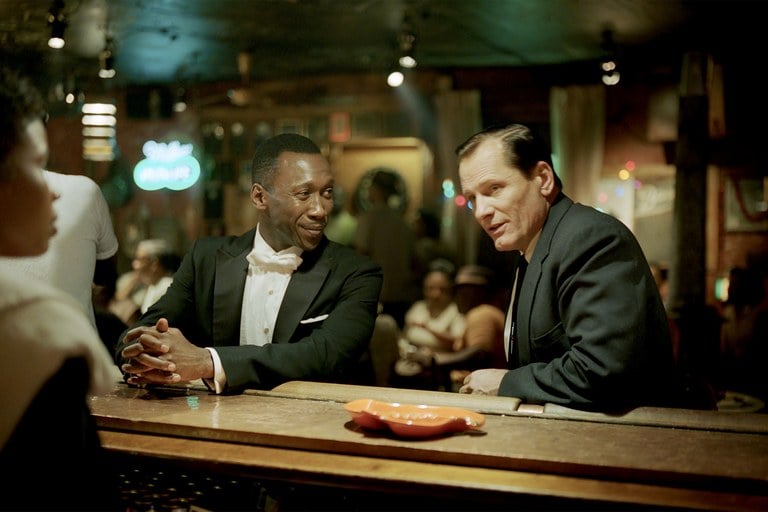Green Book, inspired by a true story, is directed by Peter Farrelly and stars Viggo Mortensen and Mahershala Ali.
After the club he bounces for is shut for renovations, a working-class Italian-American, Tony Lip (Mortensen) needs work desperately to provide for his family. He soon gets work as a driver for Dr Don Shirley, an African-American piano player who hires him for a trip for concerts set around the Deep South during the early 1960s. Whilst on tour, both men must put their social differences behind them and learn to tolerate each other in a time of great political and racial strife.
Mortensen as Tony completely transforms himself physically and mentally. His weight gain makes him completely unrecognisable and his speech is hauntingly accurate. His commitment is absolutely astounding and shines in both his funny and more emotional scenes. His sense of humour is infectious and creates great chemistry with not only Ali but with the audience as well. This role could have been stereotypical in the hands of another actor but Mortensen, with his range and adaptability, gives us a character to really root for, even if some of his beliefs and views are skewed somewhat. Saying that his growth throughout the film as he builds up his relationship with Ali’s Shirley is effortless. Mortensen proves once again that he can pull off even the toughest dramatic roles in an emphatic fashion and continues to show Hollywood that he is a true and rare talent.
Ali also has something to show the industry, and that is that he is one of the most hardworking, dynamic and promising young actors in the business. It is hard to compare Ali with Mortensen because their characters are so different. Shirley is upstanding, well spoken and secretive. Ali carries him with him a swagger and a cool head which makes interactions with Tony funnier and at times, heartbreaking. Ali’s attention to detail for his character is unmatched, from his speech to his strange sense of humour, clashing with Tony’s personality on multiple occasions. These quirks and ultimate clash of ideologies makes the pair so enjoyable and interesting to understand and just look at. Their differences are what make these characters such a joy to simply listen to, let alone watch. Their chemistry is second to none and the relationship sets a very high benchmark for other double acts, whether dramatic or comedic, to meet going forward.
Although Farrelly’s direction is good for this type of story, his eye for period authenticity is notable here. Everything from the costumes, cars and, most importantly, the music is well done and elevate the film despite its barnstorming performances. The era of early 1960s America is beautiful and unapologetic. The film forefronts the social and racial issues but works because of the work put into realising the period for the screen. Set against these levels of accuracy, these issues of inequality become heightened and serve a purpose aesthetically as well as narratively. It all works seamlessly to bring the audience closer to the characters and their story of acceptance and friendship through a troubled time in American history. These aspects also make the film more believable of course but carries an upbeat and light tone. The music especially is one of the most essential of these, with choices that encapsulate the era perfectly and even helps the characters through rough situations.
Even if it does seem made to win awards, that should not take away from the power of this film. The story is important and the performances excellent. Despite rather conventional camera work, there is a terrific sense of place and time which the film has. Green Book gives us a glimpse into life during political upheaval and social injustice and the core relationship at its centre is one of the most powerful double acts I’ve seen in years, setting a new level of performance. Hollywood should definitely sit up and pay attention to this one as the Oscars roll around once again. Good show.



